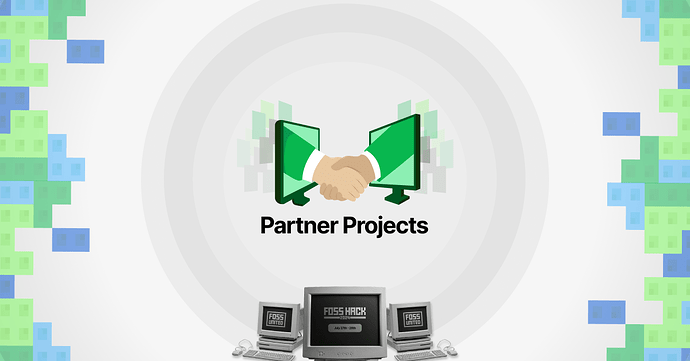![]() Check out Open Code-Walkthrough Sessions for Partner Projects.
Check out Open Code-Walkthrough Sessions for Partner Projects. ![]()
The Partner Projects program is an effort to provide FOSS Hack participants with time and mentorship to be able to contribute to existing open-source projects.
Context
We had attempted this programme as a small experiment during FOSS Hack 3.0, which didn’t pick up well as expected.
What could have improved ?
- The plan and structure was set up quite late.
- Lack of bandwidth to manage and follow-up.
- Setup up workflows that reduces overheads
- Follow-up systems for feedback.
- Spreading awareness
Hence, this edition, we are attempting a revamped version of this programme, in addition to it being a mock-run for structuring Season of Commits.
We are very much open to feedback and suggestions as comments in thread, that would help in structuring this better.
We are also welcoming volunteers, do comment your interest in this thread as well.
Proposed Structure of the Programme
1. Curation of partner projects:
- Our aim is to have between 5 - 10 open source projects looking for contributions and can spend some time and resources.
- Each project ought to have a dedicated issue list for the participants to look through.
- The projects will be listed on the FOSS Hack website, linked to their issue boards.
- Community and commercial projects will be categorised separately.
2. Opening issue list to participants:
- A participant/team can go through the list of projects and issues to choose issues to work on and submit a proposal on respective issue comments.
- Based on the proposals received, the maintainer can assign issues after the opening window closes.
3. Prep Period
-
Proposing a period of 15 days.
-
The participants with issue assigned can enlist their projects on the FOSS Hack platform.
-
Interact with the maintainers to get an onboarding on the project, codebase queries, issue-related queries etc.
- Issue related queries are preferred to be done on issue discussions threads.
- General queries can be made on dedicated project discussion channels, the FOSS Hack Telegram group can also be utilised for the same.
4. Hacking:
- Code commits are to be made during the hackathon period: 27th - 28th July (36 hours).
- Queries, doubts etc can also be made and cleared during this time.
5. Evaluation:
- We would like the maintainers to review the list of PRs submitted for the project and merge them based on merit and value added.
Proposed Timeline
| Title | Date |
|---|---|
| Finalising partner projects | 10 June 2024 |
| Open issue list to participants | 13 June - 3rd July |
| Coordination, issue assignment, onboarding | 4th July - 10 July |
| Prep phase | 12 July - 26 July |
| Hacking | 27 July - 28 July |
| Evaluation | 29 July - 19 August |
Expectations from maintainers
-
Curate an issue-list and add a fosshack label to those issues. The issues should be:
-
Non-trivial and with enough substance to solve.
-
Solvable within a window of 30 hours along with the prep from 15 days.
-
2 or 3 similar issues can also be collated into a single issue and considered.
-
Issues should be well-drafted to make them understandable.
-
Issues could be of varying nature - bugs, feats, architecture, design, documentation etc…
-
-
Look through proposal requests and assign issues to contributors
-
Utilise the prep-phase to provide support to contributors, which could include:
- Providing an onboarding to the project.
- Helping to understand the codebase
- Resolving queries
-
Provide a forum to have discussions on general project queries.(issue specific can be done on issue discussions).
- Preferably GitHub discussions can be used.
- FOSS Hack Telegram group could also be used to make announcements about discussion calls if any etc.
-
Review PRs and merge them if significant to the project.
- The maintainers are allowed to suggest changes to the PR after submission to make them more efficient
Prizes and Recognition
-
The prizes in cash would be decided upon after the contributions are made and merged.
-
For commercial projects, prizes could be provided by the projects.
- The project maintainers would have the descretion to judge the contributions and decide prizes.
-
In the case of community projects, the prizes could be pooled from the FOSS Hack prize pool.
- Feedback will be taken from the maintainers and contributions re-evaluated by the judges to decide upon this.
Next Steps
-
We have been having open discussions with a few project maintainers about their thoughts on the programme, and few of them are interested to explore.
-
An open call for projects will help us to make the selection process more effective.
- We will release a Call for Interest for Partner Projects in 2 days. While do share suggestions of potential projects welcoming contributions in this thread, and we’ll follow-up with them too.
-
As important as it is to onboard projects, it’s also crucial to spread awareness among potential contributors as well - need to plan this section

![[FOSS Hack Partner Projects] Code Walkthrough for Amaze File Manager](https://forum.fossunited.org/uploads/default/original/2X/7/7c98e89612e76ff6817803c4d0816766ca3543f9.jpeg)
![[FOSS Hack Partner Projects] Code Walkthrough for FreeCAD](https://forum.fossunited.org/uploads/default/original/2X/5/51e1c0c06f337bf92ea671f9d3f0b867f200e7a1.jpeg)
![[FOSS Hack Partner Projects] Code-walkthrough for Compilerd](https://forum.fossunited.org/uploads/default/original/2X/c/c59bb0296e338e88abf3db8dc01c54cf9d8fa85b.jpeg)